SIM337 - Uniqlo's Business: Assessing External Environment and CSR
VerifiedAdded on 2023/06/11
|25
|6222
|327
Report
AI Summary
This report analyzes Uniqlo's business environment, focusing on external influences through PESTLE and Porter's Five Forces frameworks. It evaluates Uniqlo's Corporate Social Responsibility (CSR) policies and initiatives, covering production, environment, human resources, and community engagement. The report assesses the effectiveness of Uniqlo's CSR practices, including internal processes, customer satisfaction, and corporate governance. It concludes with recommendations for improving Uniqlo's CSR activities and overall business strategy in the competitive apparel retail industry. Desklib offers a wealth of similar solved assignments and past papers for students.
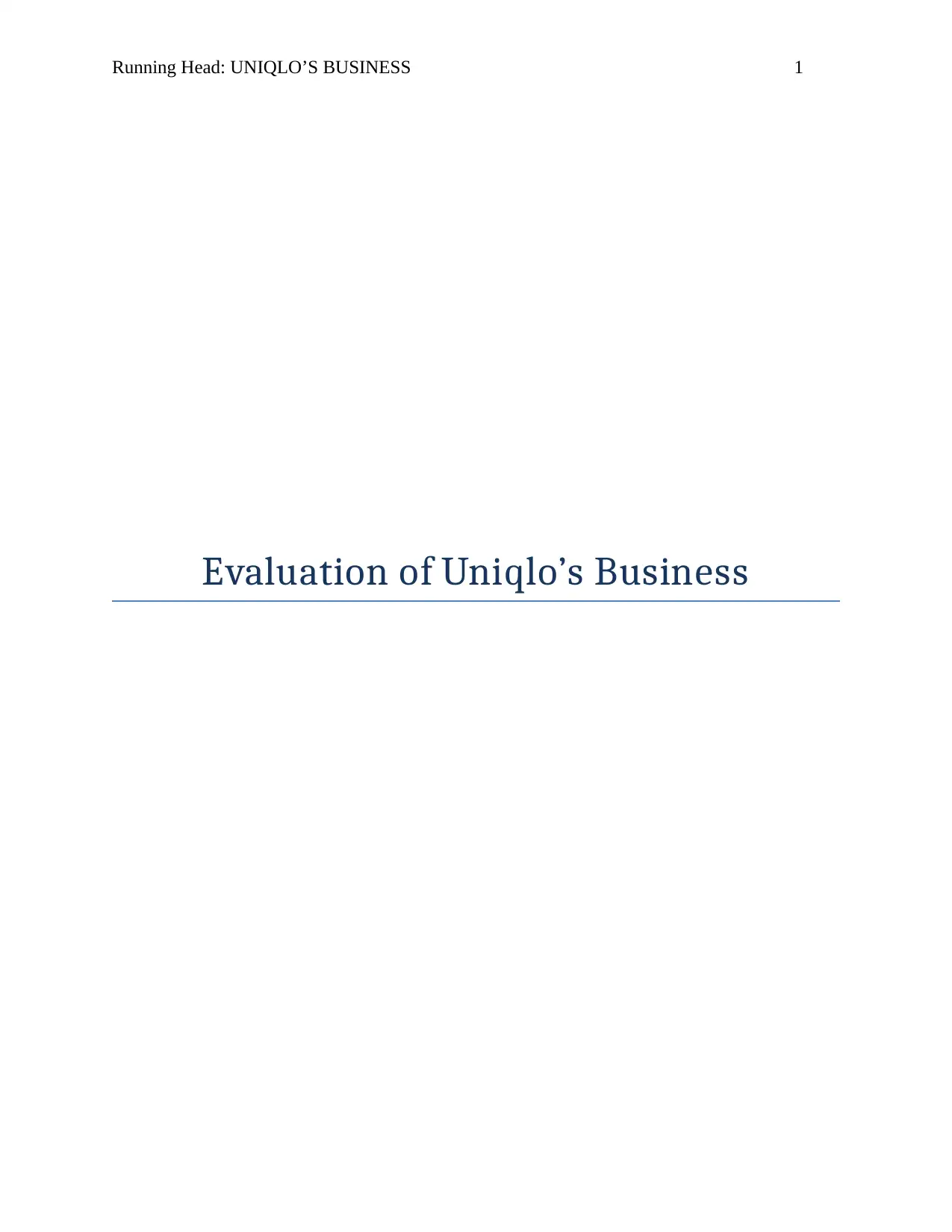
Running Head: UNIQLO’S BUSINESS 1
Evaluation of Uniqlo’s Business
Evaluation of Uniqlo’s Business
Paraphrase This Document
Need a fresh take? Get an instant paraphrase of this document with our AI Paraphraser
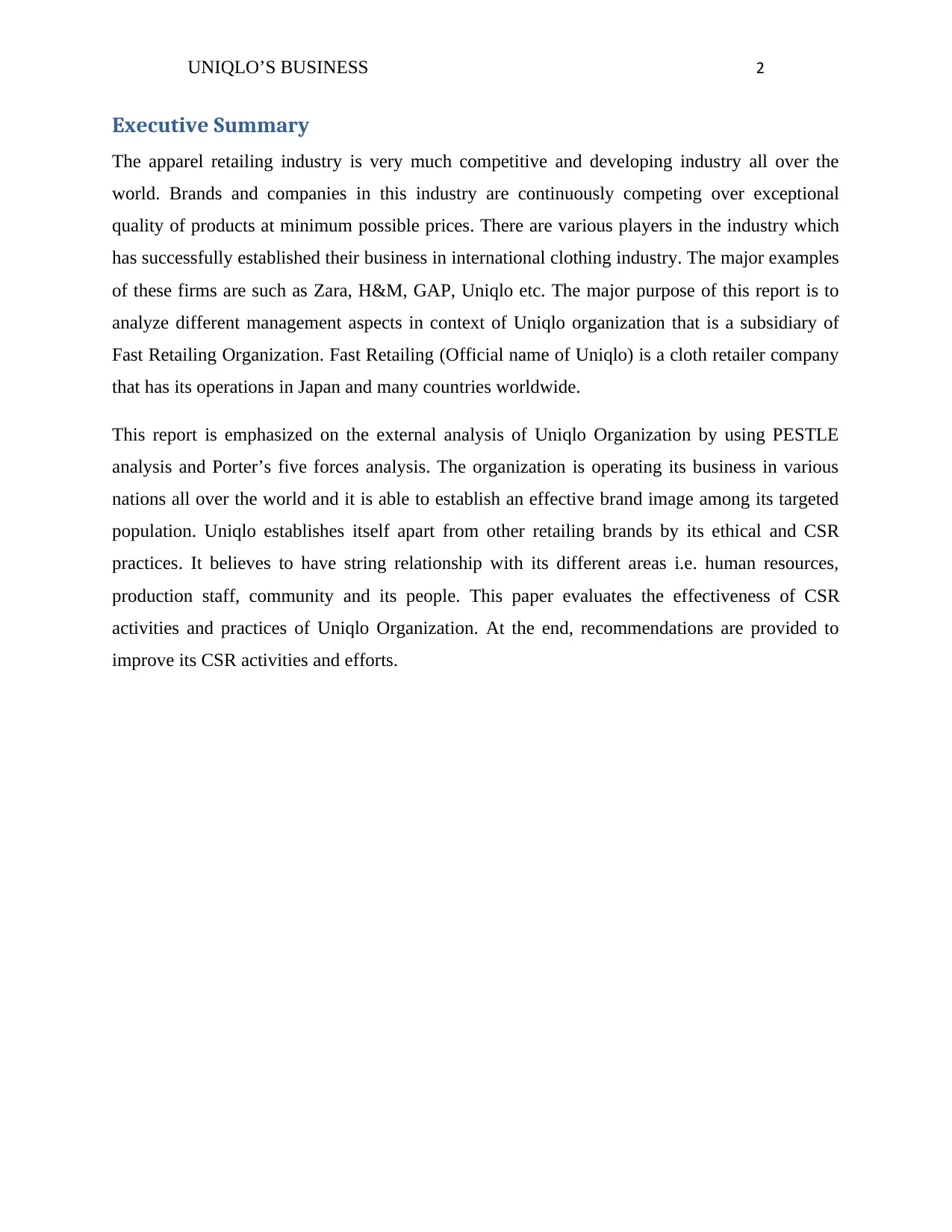
UNIQLO’S BUSINESS 2
Executive Summary
The apparel retailing industry is very much competitive and developing industry all over the
world. Brands and companies in this industry are continuously competing over exceptional
quality of products at minimum possible prices. There are various players in the industry which
has successfully established their business in international clothing industry. The major examples
of these firms are such as Zara, H&M, GAP, Uniqlo etc. The major purpose of this report is to
analyze different management aspects in context of Uniqlo organization that is a subsidiary of
Fast Retailing Organization. Fast Retailing (Official name of Uniqlo) is a cloth retailer company
that has its operations in Japan and many countries worldwide.
This report is emphasized on the external analysis of Uniqlo Organization by using PESTLE
analysis and Porter’s five forces analysis. The organization is operating its business in various
nations all over the world and it is able to establish an effective brand image among its targeted
population. Uniqlo establishes itself apart from other retailing brands by its ethical and CSR
practices. It believes to have string relationship with its different areas i.e. human resources,
production staff, community and its people. This paper evaluates the effectiveness of CSR
activities and practices of Uniqlo Organization. At the end, recommendations are provided to
improve its CSR activities and efforts.
Executive Summary
The apparel retailing industry is very much competitive and developing industry all over the
world. Brands and companies in this industry are continuously competing over exceptional
quality of products at minimum possible prices. There are various players in the industry which
has successfully established their business in international clothing industry. The major examples
of these firms are such as Zara, H&M, GAP, Uniqlo etc. The major purpose of this report is to
analyze different management aspects in context of Uniqlo organization that is a subsidiary of
Fast Retailing Organization. Fast Retailing (Official name of Uniqlo) is a cloth retailer company
that has its operations in Japan and many countries worldwide.
This report is emphasized on the external analysis of Uniqlo Organization by using PESTLE
analysis and Porter’s five forces analysis. The organization is operating its business in various
nations all over the world and it is able to establish an effective brand image among its targeted
population. Uniqlo establishes itself apart from other retailing brands by its ethical and CSR
practices. It believes to have string relationship with its different areas i.e. human resources,
production staff, community and its people. This paper evaluates the effectiveness of CSR
activities and practices of Uniqlo Organization. At the end, recommendations are provided to
improve its CSR activities and efforts.
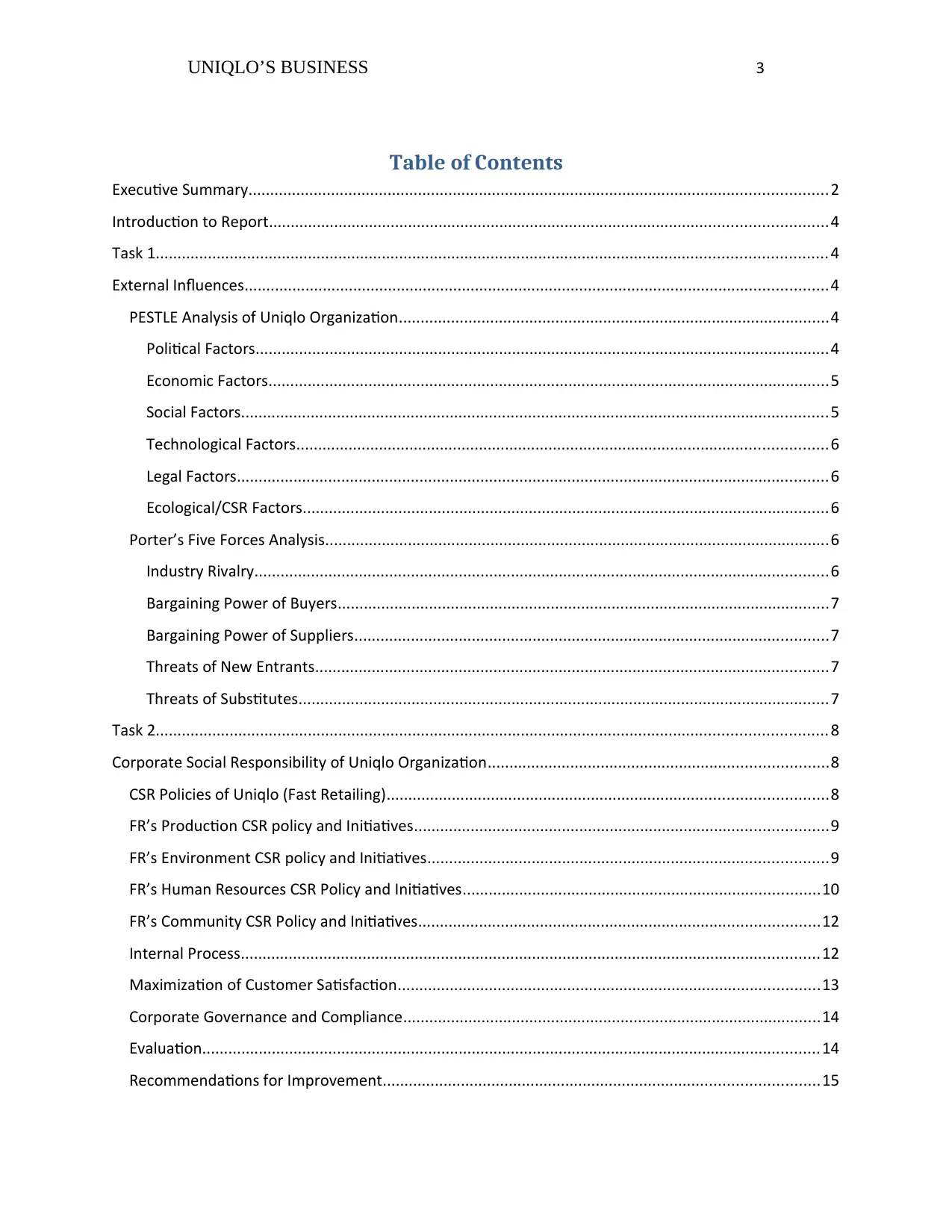
UNIQLO’S BUSINESS 3
Table of Contents
Executive Summary.....................................................................................................................................2
Introduction to Report................................................................................................................................4
Task 1..........................................................................................................................................................4
External Influences......................................................................................................................................4
PESTLE Analysis of Uniqlo Organization...................................................................................................4
Political Factors....................................................................................................................................4
Economic Factors.................................................................................................................................5
Social Factors.......................................................................................................................................5
Technological Factors..........................................................................................................................6
Legal Factors........................................................................................................................................6
Ecological/CSR Factors.........................................................................................................................6
Porter’s Five Forces Analysis....................................................................................................................6
Industry Rivalry....................................................................................................................................6
Bargaining Power of Buyers.................................................................................................................7
Bargaining Power of Suppliers.............................................................................................................7
Threats of New Entrants......................................................................................................................7
Threats of Substitutes..........................................................................................................................7
Task 2..........................................................................................................................................................8
Corporate Social Responsibility of Uniqlo Organization..............................................................................8
CSR Policies of Uniqlo (Fast Retailing).....................................................................................................8
FR’s Production CSR policy and Initiatives...............................................................................................9
FR’s Environment CSR policy and Initiatives............................................................................................9
FR’s Human Resources CSR Policy and Initiatives..................................................................................10
FR’s Community CSR Policy and Initiatives............................................................................................12
Internal Process.....................................................................................................................................12
Maximization of Customer Satisfaction.................................................................................................13
Corporate Governance and Compliance................................................................................................14
Evaluation..............................................................................................................................................14
Recommendations for Improvement....................................................................................................15
Table of Contents
Executive Summary.....................................................................................................................................2
Introduction to Report................................................................................................................................4
Task 1..........................................................................................................................................................4
External Influences......................................................................................................................................4
PESTLE Analysis of Uniqlo Organization...................................................................................................4
Political Factors....................................................................................................................................4
Economic Factors.................................................................................................................................5
Social Factors.......................................................................................................................................5
Technological Factors..........................................................................................................................6
Legal Factors........................................................................................................................................6
Ecological/CSR Factors.........................................................................................................................6
Porter’s Five Forces Analysis....................................................................................................................6
Industry Rivalry....................................................................................................................................6
Bargaining Power of Buyers.................................................................................................................7
Bargaining Power of Suppliers.............................................................................................................7
Threats of New Entrants......................................................................................................................7
Threats of Substitutes..........................................................................................................................7
Task 2..........................................................................................................................................................8
Corporate Social Responsibility of Uniqlo Organization..............................................................................8
CSR Policies of Uniqlo (Fast Retailing).....................................................................................................8
FR’s Production CSR policy and Initiatives...............................................................................................9
FR’s Environment CSR policy and Initiatives............................................................................................9
FR’s Human Resources CSR Policy and Initiatives..................................................................................10
FR’s Community CSR Policy and Initiatives............................................................................................12
Internal Process.....................................................................................................................................12
Maximization of Customer Satisfaction.................................................................................................13
Corporate Governance and Compliance................................................................................................14
Evaluation..............................................................................................................................................14
Recommendations for Improvement....................................................................................................15
⊘ This is a preview!⊘
Do you want full access?
Subscribe today to unlock all pages.

Trusted by 1+ million students worldwide
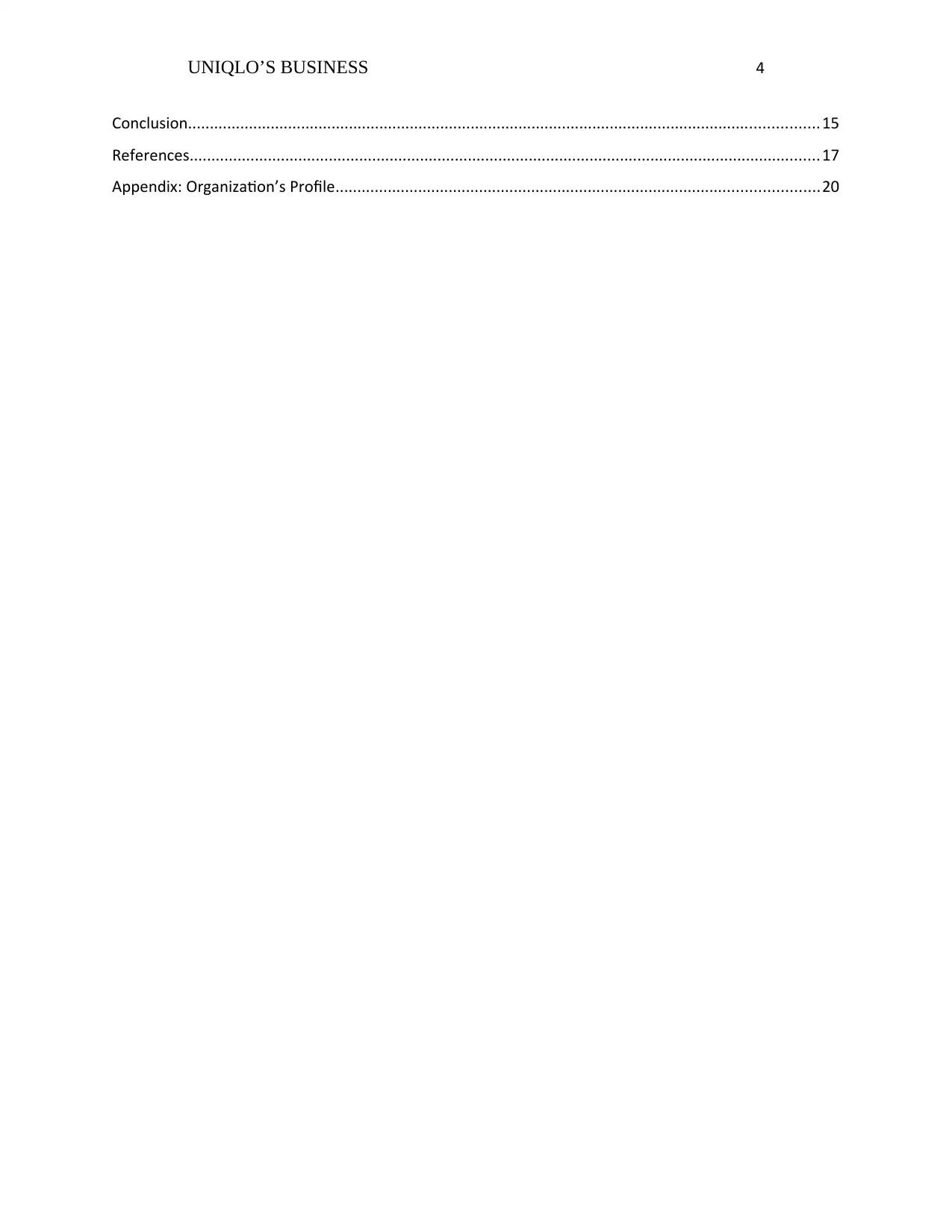
UNIQLO’S BUSINESS 4
Conclusion.................................................................................................................................................15
References.................................................................................................................................................17
Appendix: Organization’s Profile...............................................................................................................20
Conclusion.................................................................................................................................................15
References.................................................................................................................................................17
Appendix: Organization’s Profile...............................................................................................................20
Paraphrase This Document
Need a fresh take? Get an instant paraphrase of this document with our AI Paraphraser
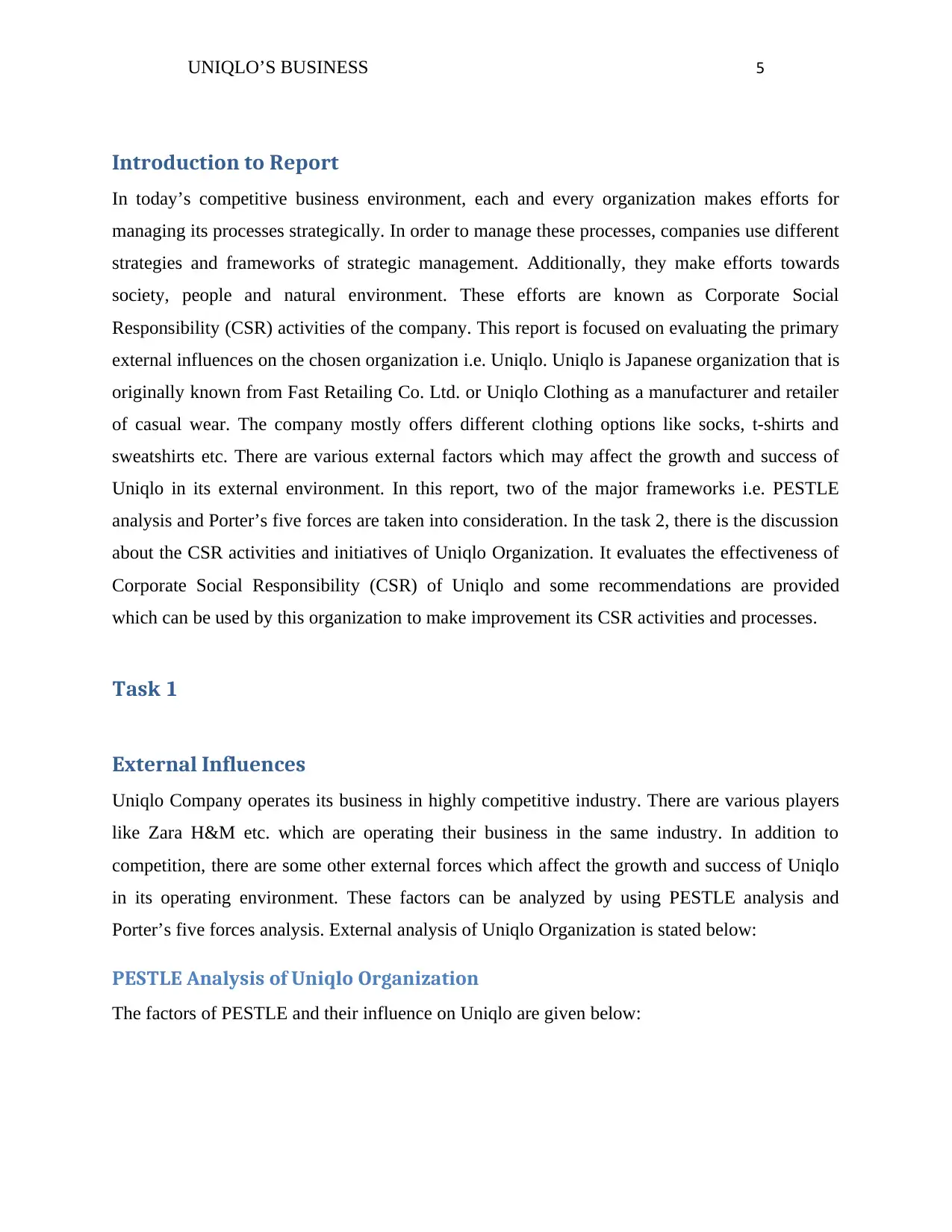
UNIQLO’S BUSINESS 5
Introduction to Report
In today’s competitive business environment, each and every organization makes efforts for
managing its processes strategically. In order to manage these processes, companies use different
strategies and frameworks of strategic management. Additionally, they make efforts towards
society, people and natural environment. These efforts are known as Corporate Social
Responsibility (CSR) activities of the company. This report is focused on evaluating the primary
external influences on the chosen organization i.e. Uniqlo. Uniqlo is Japanese organization that is
originally known from Fast Retailing Co. Ltd. or Uniqlo Clothing as a manufacturer and retailer
of casual wear. The company mostly offers different clothing options like socks, t-shirts and
sweatshirts etc. There are various external factors which may affect the growth and success of
Uniqlo in its external environment. In this report, two of the major frameworks i.e. PESTLE
analysis and Porter’s five forces are taken into consideration. In the task 2, there is the discussion
about the CSR activities and initiatives of Uniqlo Organization. It evaluates the effectiveness of
Corporate Social Responsibility (CSR) of Uniqlo and some recommendations are provided
which can be used by this organization to make improvement its CSR activities and processes.
Task 1
External Influences
Uniqlo Company operates its business in highly competitive industry. There are various players
like Zara H&M etc. which are operating their business in the same industry. In addition to
competition, there are some other external forces which affect the growth and success of Uniqlo
in its operating environment. These factors can be analyzed by using PESTLE analysis and
Porter’s five forces analysis. External analysis of Uniqlo Organization is stated below:
PESTLE Analysis of Uniqlo Organization
The factors of PESTLE and their influence on Uniqlo are given below:
Introduction to Report
In today’s competitive business environment, each and every organization makes efforts for
managing its processes strategically. In order to manage these processes, companies use different
strategies and frameworks of strategic management. Additionally, they make efforts towards
society, people and natural environment. These efforts are known as Corporate Social
Responsibility (CSR) activities of the company. This report is focused on evaluating the primary
external influences on the chosen organization i.e. Uniqlo. Uniqlo is Japanese organization that is
originally known from Fast Retailing Co. Ltd. or Uniqlo Clothing as a manufacturer and retailer
of casual wear. The company mostly offers different clothing options like socks, t-shirts and
sweatshirts etc. There are various external factors which may affect the growth and success of
Uniqlo in its external environment. In this report, two of the major frameworks i.e. PESTLE
analysis and Porter’s five forces are taken into consideration. In the task 2, there is the discussion
about the CSR activities and initiatives of Uniqlo Organization. It evaluates the effectiveness of
Corporate Social Responsibility (CSR) of Uniqlo and some recommendations are provided
which can be used by this organization to make improvement its CSR activities and processes.
Task 1
External Influences
Uniqlo Company operates its business in highly competitive industry. There are various players
like Zara H&M etc. which are operating their business in the same industry. In addition to
competition, there are some other external forces which affect the growth and success of Uniqlo
in its operating environment. These factors can be analyzed by using PESTLE analysis and
Porter’s five forces analysis. External analysis of Uniqlo Organization is stated below:
PESTLE Analysis of Uniqlo Organization
The factors of PESTLE and their influence on Uniqlo are given below:
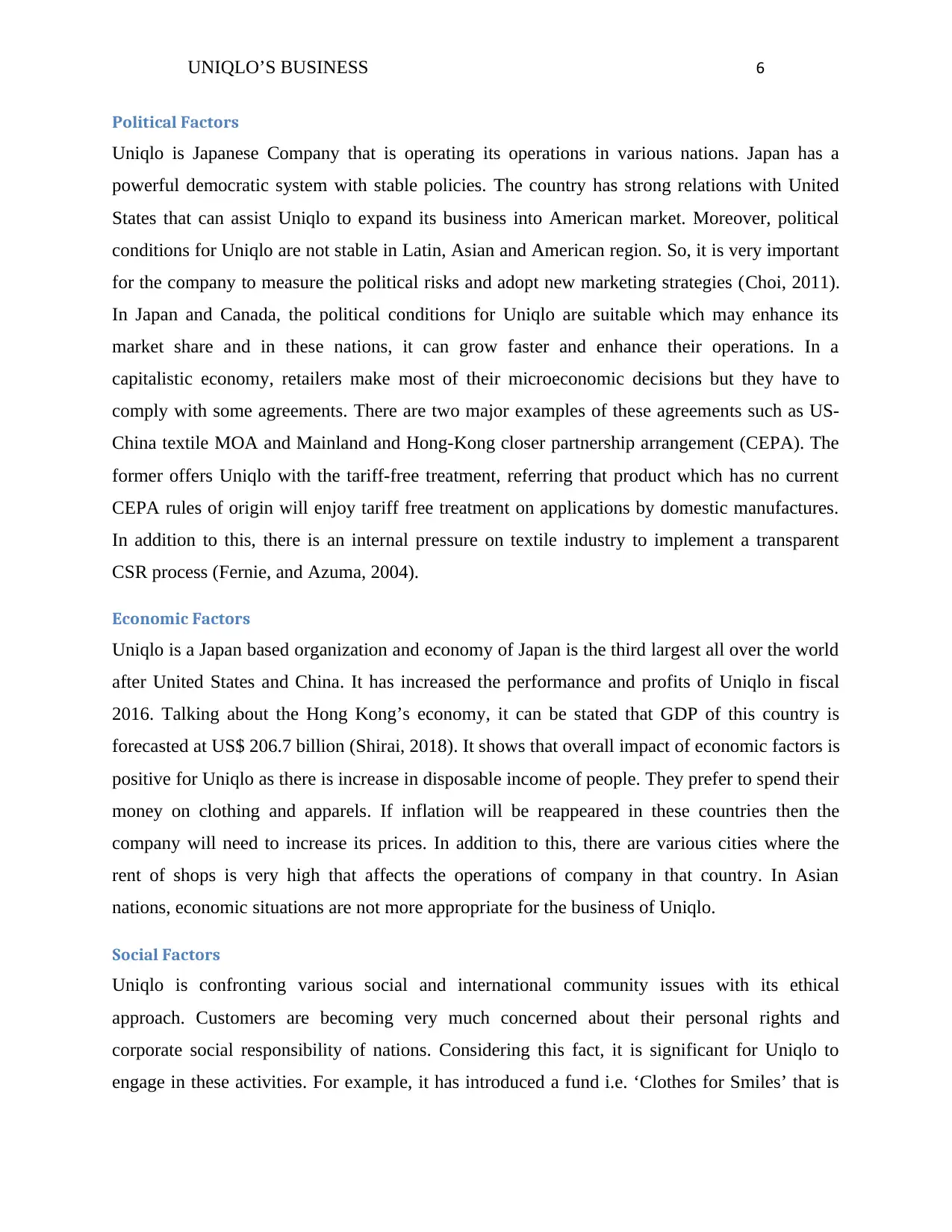
UNIQLO’S BUSINESS 6
Political Factors
Uniqlo is Japanese Company that is operating its operations in various nations. Japan has a
powerful democratic system with stable policies. The country has strong relations with United
States that can assist Uniqlo to expand its business into American market. Moreover, political
conditions for Uniqlo are not stable in Latin, Asian and American region. So, it is very important
for the company to measure the political risks and adopt new marketing strategies (Choi, 2011).
In Japan and Canada, the political conditions for Uniqlo are suitable which may enhance its
market share and in these nations, it can grow faster and enhance their operations. In a
capitalistic economy, retailers make most of their microeconomic decisions but they have to
comply with some agreements. There are two major examples of these agreements such as US-
China textile MOA and Mainland and Hong-Kong closer partnership arrangement (CEPA). The
former offers Uniqlo with the tariff-free treatment, referring that product which has no current
CEPA rules of origin will enjoy tariff free treatment on applications by domestic manufactures.
In addition to this, there is an internal pressure on textile industry to implement a transparent
CSR process (Fernie, and Azuma, 2004).
Economic Factors
Uniqlo is a Japan based organization and economy of Japan is the third largest all over the world
after United States and China. It has increased the performance and profits of Uniqlo in fiscal
2016. Talking about the Hong Kong’s economy, it can be stated that GDP of this country is
forecasted at US$ 206.7 billion (Shirai, 2018). It shows that overall impact of economic factors is
positive for Uniqlo as there is increase in disposable income of people. They prefer to spend their
money on clothing and apparels. If inflation will be reappeared in these countries then the
company will need to increase its prices. In addition to this, there are various cities where the
rent of shops is very high that affects the operations of company in that country. In Asian
nations, economic situations are not more appropriate for the business of Uniqlo.
Social Factors
Uniqlo is confronting various social and international community issues with its ethical
approach. Customers are becoming very much concerned about their personal rights and
corporate social responsibility of nations. Considering this fact, it is significant for Uniqlo to
engage in these activities. For example, it has introduced a fund i.e. ‘Clothes for Smiles’ that is
Political Factors
Uniqlo is Japanese Company that is operating its operations in various nations. Japan has a
powerful democratic system with stable policies. The country has strong relations with United
States that can assist Uniqlo to expand its business into American market. Moreover, political
conditions for Uniqlo are not stable in Latin, Asian and American region. So, it is very important
for the company to measure the political risks and adopt new marketing strategies (Choi, 2011).
In Japan and Canada, the political conditions for Uniqlo are suitable which may enhance its
market share and in these nations, it can grow faster and enhance their operations. In a
capitalistic economy, retailers make most of their microeconomic decisions but they have to
comply with some agreements. There are two major examples of these agreements such as US-
China textile MOA and Mainland and Hong-Kong closer partnership arrangement (CEPA). The
former offers Uniqlo with the tariff-free treatment, referring that product which has no current
CEPA rules of origin will enjoy tariff free treatment on applications by domestic manufactures.
In addition to this, there is an internal pressure on textile industry to implement a transparent
CSR process (Fernie, and Azuma, 2004).
Economic Factors
Uniqlo is a Japan based organization and economy of Japan is the third largest all over the world
after United States and China. It has increased the performance and profits of Uniqlo in fiscal
2016. Talking about the Hong Kong’s economy, it can be stated that GDP of this country is
forecasted at US$ 206.7 billion (Shirai, 2018). It shows that overall impact of economic factors is
positive for Uniqlo as there is increase in disposable income of people. They prefer to spend their
money on clothing and apparels. If inflation will be reappeared in these countries then the
company will need to increase its prices. In addition to this, there are various cities where the
rent of shops is very high that affects the operations of company in that country. In Asian
nations, economic situations are not more appropriate for the business of Uniqlo.
Social Factors
Uniqlo is confronting various social and international community issues with its ethical
approach. Customers are becoming very much concerned about their personal rights and
corporate social responsibility of nations. Considering this fact, it is significant for Uniqlo to
engage in these activities. For example, it has introduced a fund i.e. ‘Clothes for Smiles’ that is
⊘ This is a preview!⊘
Do you want full access?
Subscribe today to unlock all pages.

Trusted by 1+ million students worldwide
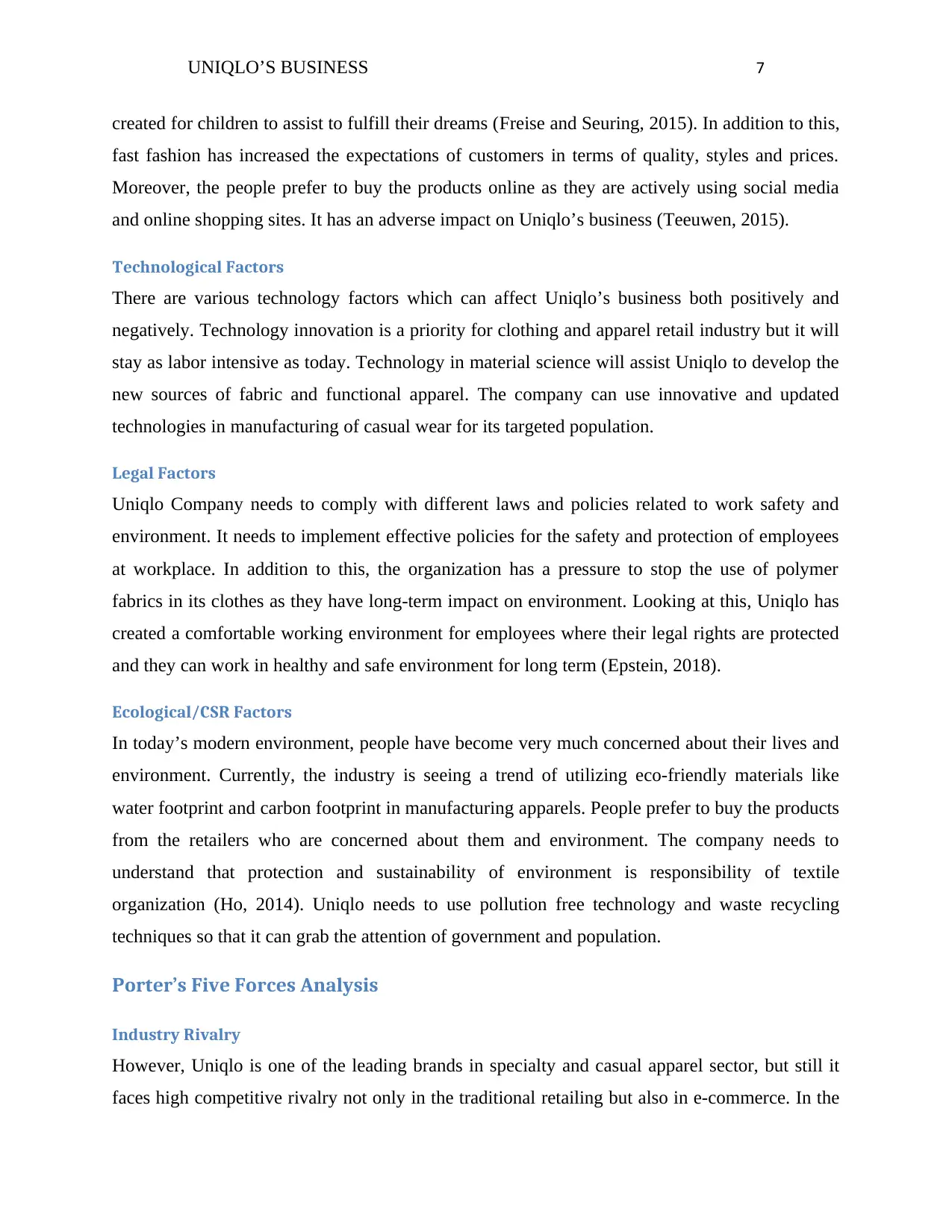
UNIQLO’S BUSINESS 7
created for children to assist to fulfill their dreams (Freise and Seuring, 2015). In addition to this,
fast fashion has increased the expectations of customers in terms of quality, styles and prices.
Moreover, the people prefer to buy the products online as they are actively using social media
and online shopping sites. It has an adverse impact on Uniqlo’s business (Teeuwen, 2015).
Technological Factors
There are various technology factors which can affect Uniqlo’s business both positively and
negatively. Technology innovation is a priority for clothing and apparel retail industry but it will
stay as labor intensive as today. Technology in material science will assist Uniqlo to develop the
new sources of fabric and functional apparel. The company can use innovative and updated
technologies in manufacturing of casual wear for its targeted population.
Legal Factors
Uniqlo Company needs to comply with different laws and policies related to work safety and
environment. It needs to implement effective policies for the safety and protection of employees
at workplace. In addition to this, the organization has a pressure to stop the use of polymer
fabrics in its clothes as they have long-term impact on environment. Looking at this, Uniqlo has
created a comfortable working environment for employees where their legal rights are protected
and they can work in healthy and safe environment for long term (Epstein, 2018).
Ecological/CSR Factors
In today’s modern environment, people have become very much concerned about their lives and
environment. Currently, the industry is seeing a trend of utilizing eco-friendly materials like
water footprint and carbon footprint in manufacturing apparels. People prefer to buy the products
from the retailers who are concerned about them and environment. The company needs to
understand that protection and sustainability of environment is responsibility of textile
organization (Ho, 2014). Uniqlo needs to use pollution free technology and waste recycling
techniques so that it can grab the attention of government and population.
Porter’s Five Forces Analysis
Industry Rivalry
However, Uniqlo is one of the leading brands in specialty and casual apparel sector, but still it
faces high competitive rivalry not only in the traditional retailing but also in e-commerce. In the
created for children to assist to fulfill their dreams (Freise and Seuring, 2015). In addition to this,
fast fashion has increased the expectations of customers in terms of quality, styles and prices.
Moreover, the people prefer to buy the products online as they are actively using social media
and online shopping sites. It has an adverse impact on Uniqlo’s business (Teeuwen, 2015).
Technological Factors
There are various technology factors which can affect Uniqlo’s business both positively and
negatively. Technology innovation is a priority for clothing and apparel retail industry but it will
stay as labor intensive as today. Technology in material science will assist Uniqlo to develop the
new sources of fabric and functional apparel. The company can use innovative and updated
technologies in manufacturing of casual wear for its targeted population.
Legal Factors
Uniqlo Company needs to comply with different laws and policies related to work safety and
environment. It needs to implement effective policies for the safety and protection of employees
at workplace. In addition to this, the organization has a pressure to stop the use of polymer
fabrics in its clothes as they have long-term impact on environment. Looking at this, Uniqlo has
created a comfortable working environment for employees where their legal rights are protected
and they can work in healthy and safe environment for long term (Epstein, 2018).
Ecological/CSR Factors
In today’s modern environment, people have become very much concerned about their lives and
environment. Currently, the industry is seeing a trend of utilizing eco-friendly materials like
water footprint and carbon footprint in manufacturing apparels. People prefer to buy the products
from the retailers who are concerned about them and environment. The company needs to
understand that protection and sustainability of environment is responsibility of textile
organization (Ho, 2014). Uniqlo needs to use pollution free technology and waste recycling
techniques so that it can grab the attention of government and population.
Porter’s Five Forces Analysis
Industry Rivalry
However, Uniqlo is one of the leading brands in specialty and casual apparel sector, but still it
faces high competitive rivalry not only in the traditional retailing but also in e-commerce. In the
Paraphrase This Document
Need a fresh take? Get an instant paraphrase of this document with our AI Paraphraser
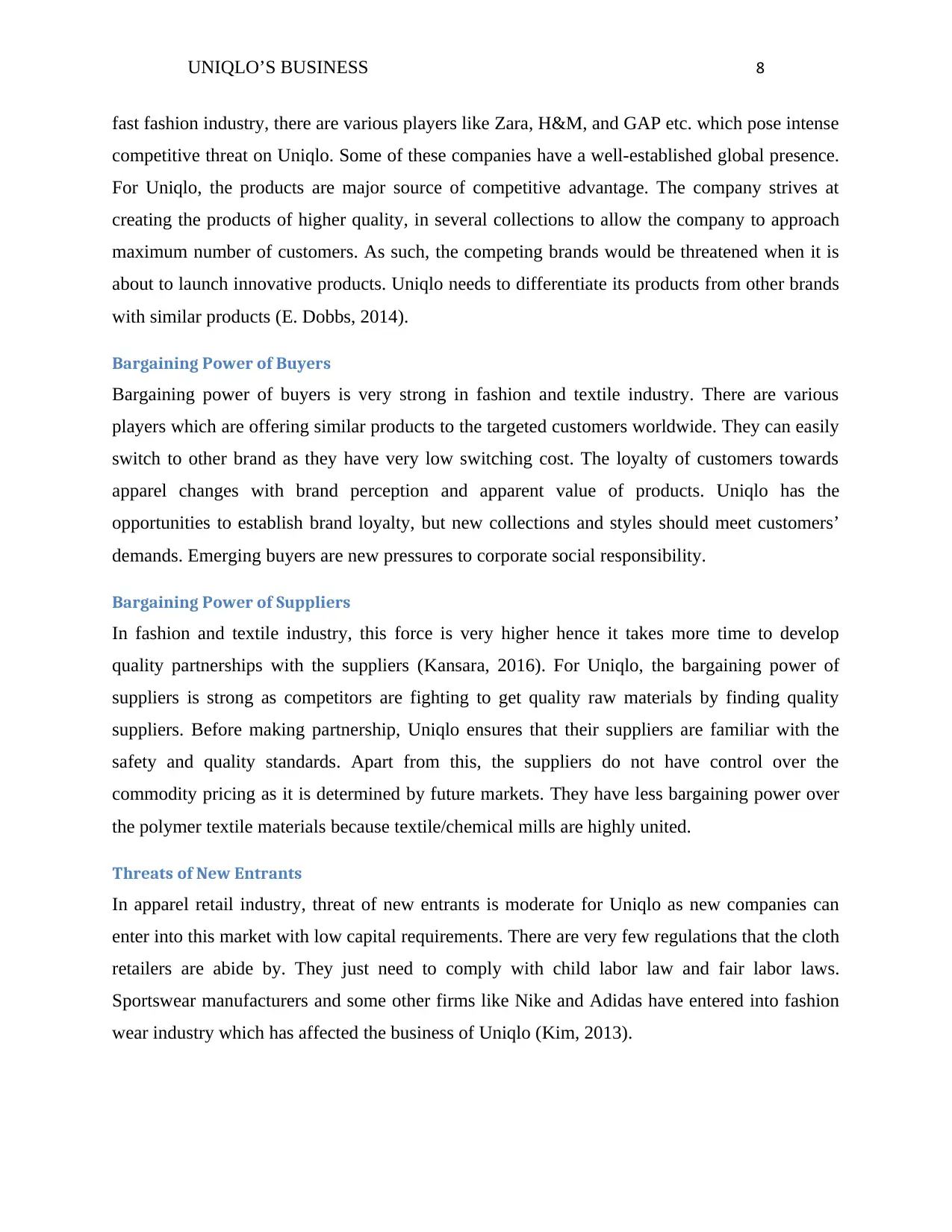
UNIQLO’S BUSINESS 8
fast fashion industry, there are various players like Zara, H&M, and GAP etc. which pose intense
competitive threat on Uniqlo. Some of these companies have a well-established global presence.
For Uniqlo, the products are major source of competitive advantage. The company strives at
creating the products of higher quality, in several collections to allow the company to approach
maximum number of customers. As such, the competing brands would be threatened when it is
about to launch innovative products. Uniqlo needs to differentiate its products from other brands
with similar products (E. Dobbs, 2014).
Bargaining Power of Buyers
Bargaining power of buyers is very strong in fashion and textile industry. There are various
players which are offering similar products to the targeted customers worldwide. They can easily
switch to other brand as they have very low switching cost. The loyalty of customers towards
apparel changes with brand perception and apparent value of products. Uniqlo has the
opportunities to establish brand loyalty, but new collections and styles should meet customers’
demands. Emerging buyers are new pressures to corporate social responsibility.
Bargaining Power of Suppliers
In fashion and textile industry, this force is very higher hence it takes more time to develop
quality partnerships with the suppliers (Kansara, 2016). For Uniqlo, the bargaining power of
suppliers is strong as competitors are fighting to get quality raw materials by finding quality
suppliers. Before making partnership, Uniqlo ensures that their suppliers are familiar with the
safety and quality standards. Apart from this, the suppliers do not have control over the
commodity pricing as it is determined by future markets. They have less bargaining power over
the polymer textile materials because textile/chemical mills are highly united.
Threats of New Entrants
In apparel retail industry, threat of new entrants is moderate for Uniqlo as new companies can
enter into this market with low capital requirements. There are very few regulations that the cloth
retailers are abide by. They just need to comply with child labor law and fair labor laws.
Sportswear manufacturers and some other firms like Nike and Adidas have entered into fashion
wear industry which has affected the business of Uniqlo (Kim, 2013).
fast fashion industry, there are various players like Zara, H&M, and GAP etc. which pose intense
competitive threat on Uniqlo. Some of these companies have a well-established global presence.
For Uniqlo, the products are major source of competitive advantage. The company strives at
creating the products of higher quality, in several collections to allow the company to approach
maximum number of customers. As such, the competing brands would be threatened when it is
about to launch innovative products. Uniqlo needs to differentiate its products from other brands
with similar products (E. Dobbs, 2014).
Bargaining Power of Buyers
Bargaining power of buyers is very strong in fashion and textile industry. There are various
players which are offering similar products to the targeted customers worldwide. They can easily
switch to other brand as they have very low switching cost. The loyalty of customers towards
apparel changes with brand perception and apparent value of products. Uniqlo has the
opportunities to establish brand loyalty, but new collections and styles should meet customers’
demands. Emerging buyers are new pressures to corporate social responsibility.
Bargaining Power of Suppliers
In fashion and textile industry, this force is very higher hence it takes more time to develop
quality partnerships with the suppliers (Kansara, 2016). For Uniqlo, the bargaining power of
suppliers is strong as competitors are fighting to get quality raw materials by finding quality
suppliers. Before making partnership, Uniqlo ensures that their suppliers are familiar with the
safety and quality standards. Apart from this, the suppliers do not have control over the
commodity pricing as it is determined by future markets. They have less bargaining power over
the polymer textile materials because textile/chemical mills are highly united.
Threats of New Entrants
In apparel retail industry, threat of new entrants is moderate for Uniqlo as new companies can
enter into this market with low capital requirements. There are very few regulations that the cloth
retailers are abide by. They just need to comply with child labor law and fair labor laws.
Sportswear manufacturers and some other firms like Nike and Adidas have entered into fashion
wear industry which has affected the business of Uniqlo (Kim, 2013).
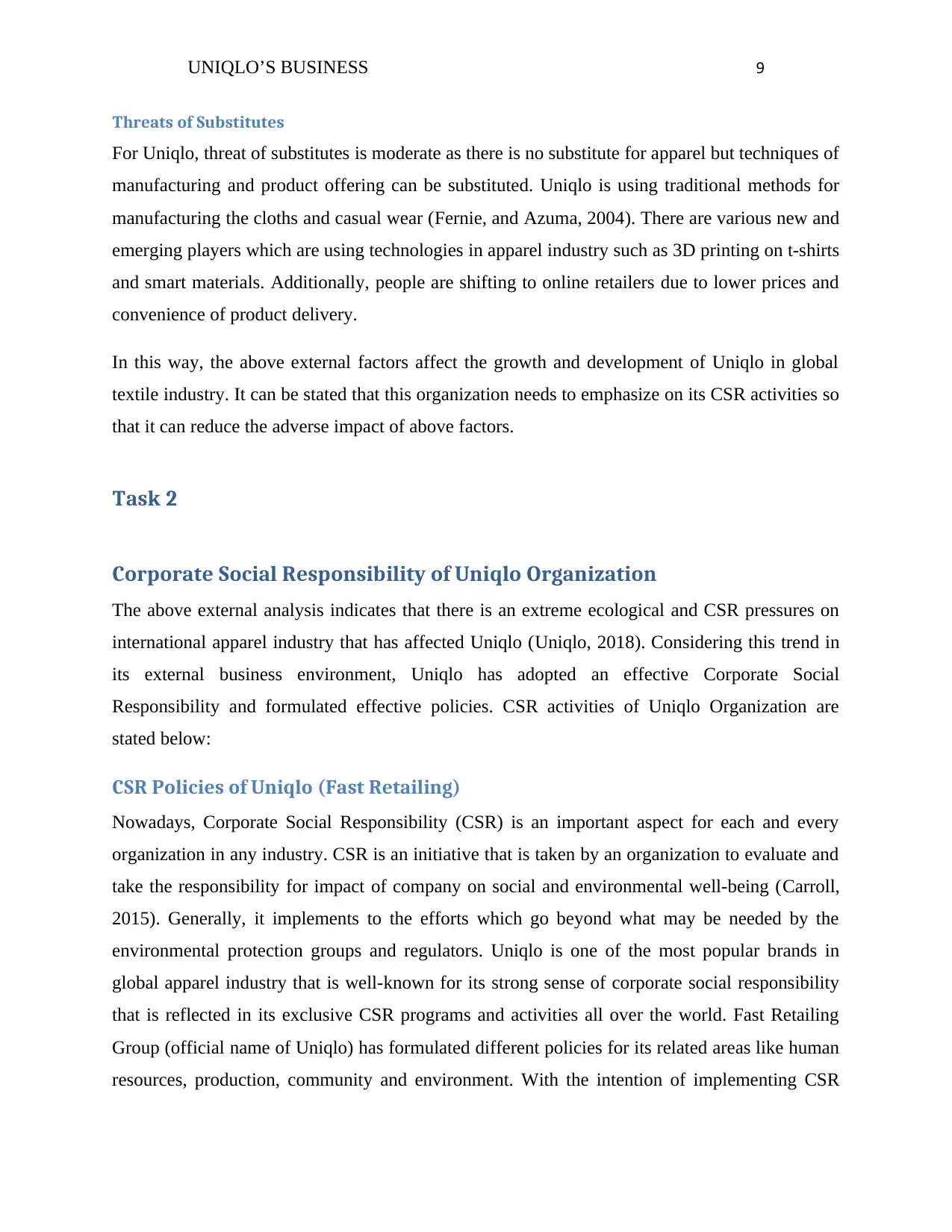
UNIQLO’S BUSINESS 9
Threats of Substitutes
For Uniqlo, threat of substitutes is moderate as there is no substitute for apparel but techniques of
manufacturing and product offering can be substituted. Uniqlo is using traditional methods for
manufacturing the cloths and casual wear (Fernie, and Azuma, 2004). There are various new and
emerging players which are using technologies in apparel industry such as 3D printing on t-shirts
and smart materials. Additionally, people are shifting to online retailers due to lower prices and
convenience of product delivery.
In this way, the above external factors affect the growth and development of Uniqlo in global
textile industry. It can be stated that this organization needs to emphasize on its CSR activities so
that it can reduce the adverse impact of above factors.
Task 2
Corporate Social Responsibility of Uniqlo Organization
The above external analysis indicates that there is an extreme ecological and CSR pressures on
international apparel industry that has affected Uniqlo (Uniqlo, 2018). Considering this trend in
its external business environment, Uniqlo has adopted an effective Corporate Social
Responsibility and formulated effective policies. CSR activities of Uniqlo Organization are
stated below:
CSR Policies of Uniqlo (Fast Retailing)
Nowadays, Corporate Social Responsibility (CSR) is an important aspect for each and every
organization in any industry. CSR is an initiative that is taken by an organization to evaluate and
take the responsibility for impact of company on social and environmental well-being (Carroll,
2015). Generally, it implements to the efforts which go beyond what may be needed by the
environmental protection groups and regulators. Uniqlo is one of the most popular brands in
global apparel industry that is well-known for its strong sense of corporate social responsibility
that is reflected in its exclusive CSR programs and activities all over the world. Fast Retailing
Group (official name of Uniqlo) has formulated different policies for its related areas like human
resources, production, community and environment. With the intention of implementing CSR
Threats of Substitutes
For Uniqlo, threat of substitutes is moderate as there is no substitute for apparel but techniques of
manufacturing and product offering can be substituted. Uniqlo is using traditional methods for
manufacturing the cloths and casual wear (Fernie, and Azuma, 2004). There are various new and
emerging players which are using technologies in apparel industry such as 3D printing on t-shirts
and smart materials. Additionally, people are shifting to online retailers due to lower prices and
convenience of product delivery.
In this way, the above external factors affect the growth and development of Uniqlo in global
textile industry. It can be stated that this organization needs to emphasize on its CSR activities so
that it can reduce the adverse impact of above factors.
Task 2
Corporate Social Responsibility of Uniqlo Organization
The above external analysis indicates that there is an extreme ecological and CSR pressures on
international apparel industry that has affected Uniqlo (Uniqlo, 2018). Considering this trend in
its external business environment, Uniqlo has adopted an effective Corporate Social
Responsibility and formulated effective policies. CSR activities of Uniqlo Organization are
stated below:
CSR Policies of Uniqlo (Fast Retailing)
Nowadays, Corporate Social Responsibility (CSR) is an important aspect for each and every
organization in any industry. CSR is an initiative that is taken by an organization to evaluate and
take the responsibility for impact of company on social and environmental well-being (Carroll,
2015). Generally, it implements to the efforts which go beyond what may be needed by the
environmental protection groups and regulators. Uniqlo is one of the most popular brands in
global apparel industry that is well-known for its strong sense of corporate social responsibility
that is reflected in its exclusive CSR programs and activities all over the world. Fast Retailing
Group (official name of Uniqlo) has formulated different policies for its related areas like human
resources, production, community and environment. With the intention of implementing CSR
⊘ This is a preview!⊘
Do you want full access?
Subscribe today to unlock all pages.

Trusted by 1+ million students worldwide
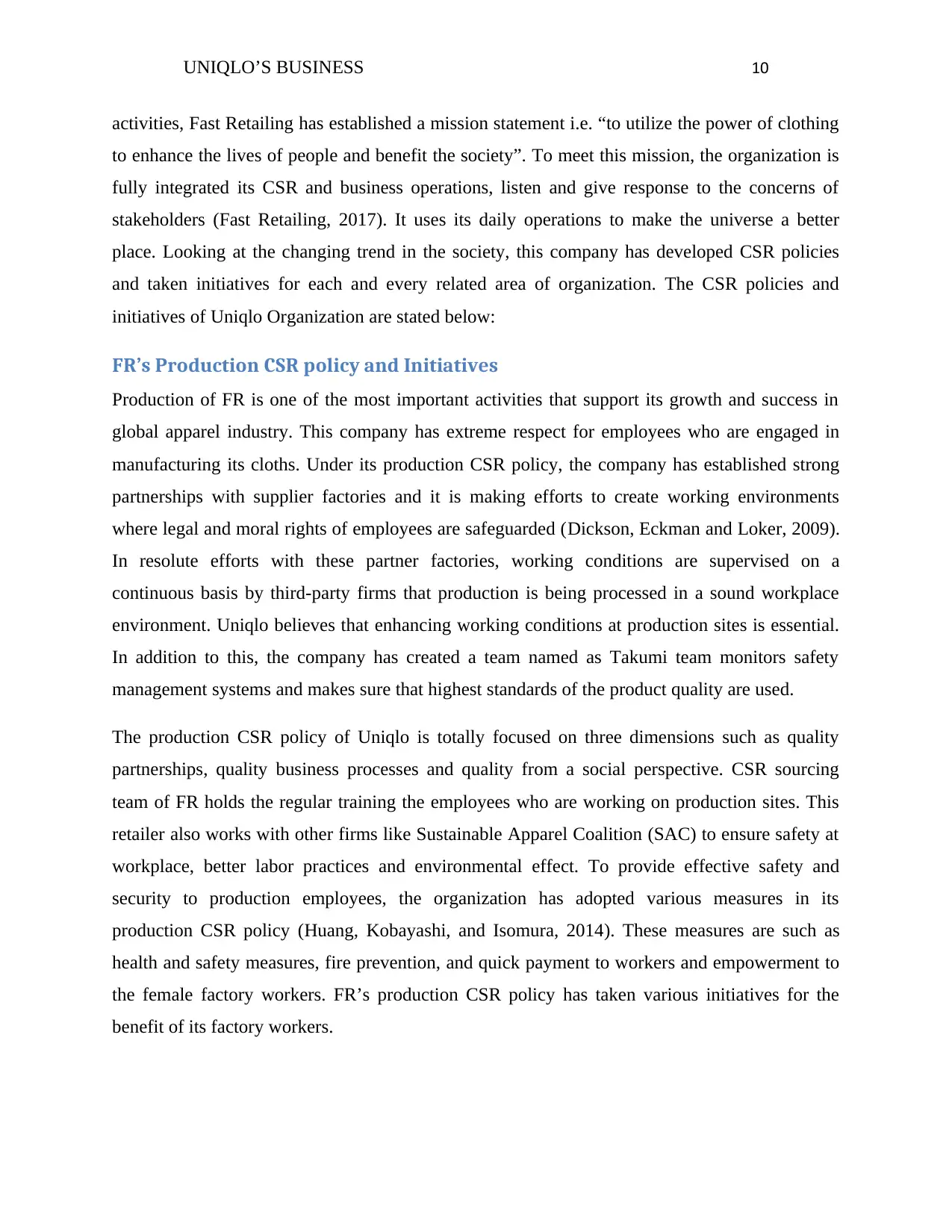
UNIQLO’S BUSINESS 10
activities, Fast Retailing has established a mission statement i.e. “to utilize the power of clothing
to enhance the lives of people and benefit the society”. To meet this mission, the organization is
fully integrated its CSR and business operations, listen and give response to the concerns of
stakeholders (Fast Retailing, 2017). It uses its daily operations to make the universe a better
place. Looking at the changing trend in the society, this company has developed CSR policies
and taken initiatives for each and every related area of organization. The CSR policies and
initiatives of Uniqlo Organization are stated below:
FR’s Production CSR policy and Initiatives
Production of FR is one of the most important activities that support its growth and success in
global apparel industry. This company has extreme respect for employees who are engaged in
manufacturing its cloths. Under its production CSR policy, the company has established strong
partnerships with supplier factories and it is making efforts to create working environments
where legal and moral rights of employees are safeguarded (Dickson, Eckman and Loker, 2009).
In resolute efforts with these partner factories, working conditions are supervised on a
continuous basis by third-party firms that production is being processed in a sound workplace
environment. Uniqlo believes that enhancing working conditions at production sites is essential.
In addition to this, the company has created a team named as Takumi team monitors safety
management systems and makes sure that highest standards of the product quality are used.
The production CSR policy of Uniqlo is totally focused on three dimensions such as quality
partnerships, quality business processes and quality from a social perspective. CSR sourcing
team of FR holds the regular training the employees who are working on production sites. This
retailer also works with other firms like Sustainable Apparel Coalition (SAC) to ensure safety at
workplace, better labor practices and environmental effect. To provide effective safety and
security to production employees, the organization has adopted various measures in its
production CSR policy (Huang, Kobayashi, and Isomura, 2014). These measures are such as
health and safety measures, fire prevention, and quick payment to workers and empowerment to
the female factory workers. FR’s production CSR policy has taken various initiatives for the
benefit of its factory workers.
activities, Fast Retailing has established a mission statement i.e. “to utilize the power of clothing
to enhance the lives of people and benefit the society”. To meet this mission, the organization is
fully integrated its CSR and business operations, listen and give response to the concerns of
stakeholders (Fast Retailing, 2017). It uses its daily operations to make the universe a better
place. Looking at the changing trend in the society, this company has developed CSR policies
and taken initiatives for each and every related area of organization. The CSR policies and
initiatives of Uniqlo Organization are stated below:
FR’s Production CSR policy and Initiatives
Production of FR is one of the most important activities that support its growth and success in
global apparel industry. This company has extreme respect for employees who are engaged in
manufacturing its cloths. Under its production CSR policy, the company has established strong
partnerships with supplier factories and it is making efforts to create working environments
where legal and moral rights of employees are safeguarded (Dickson, Eckman and Loker, 2009).
In resolute efforts with these partner factories, working conditions are supervised on a
continuous basis by third-party firms that production is being processed in a sound workplace
environment. Uniqlo believes that enhancing working conditions at production sites is essential.
In addition to this, the company has created a team named as Takumi team monitors safety
management systems and makes sure that highest standards of the product quality are used.
The production CSR policy of Uniqlo is totally focused on three dimensions such as quality
partnerships, quality business processes and quality from a social perspective. CSR sourcing
team of FR holds the regular training the employees who are working on production sites. This
retailer also works with other firms like Sustainable Apparel Coalition (SAC) to ensure safety at
workplace, better labor practices and environmental effect. To provide effective safety and
security to production employees, the organization has adopted various measures in its
production CSR policy (Huang, Kobayashi, and Isomura, 2014). These measures are such as
health and safety measures, fire prevention, and quick payment to workers and empowerment to
the female factory workers. FR’s production CSR policy has taken various initiatives for the
benefit of its factory workers.
Paraphrase This Document
Need a fresh take? Get an instant paraphrase of this document with our AI Paraphraser
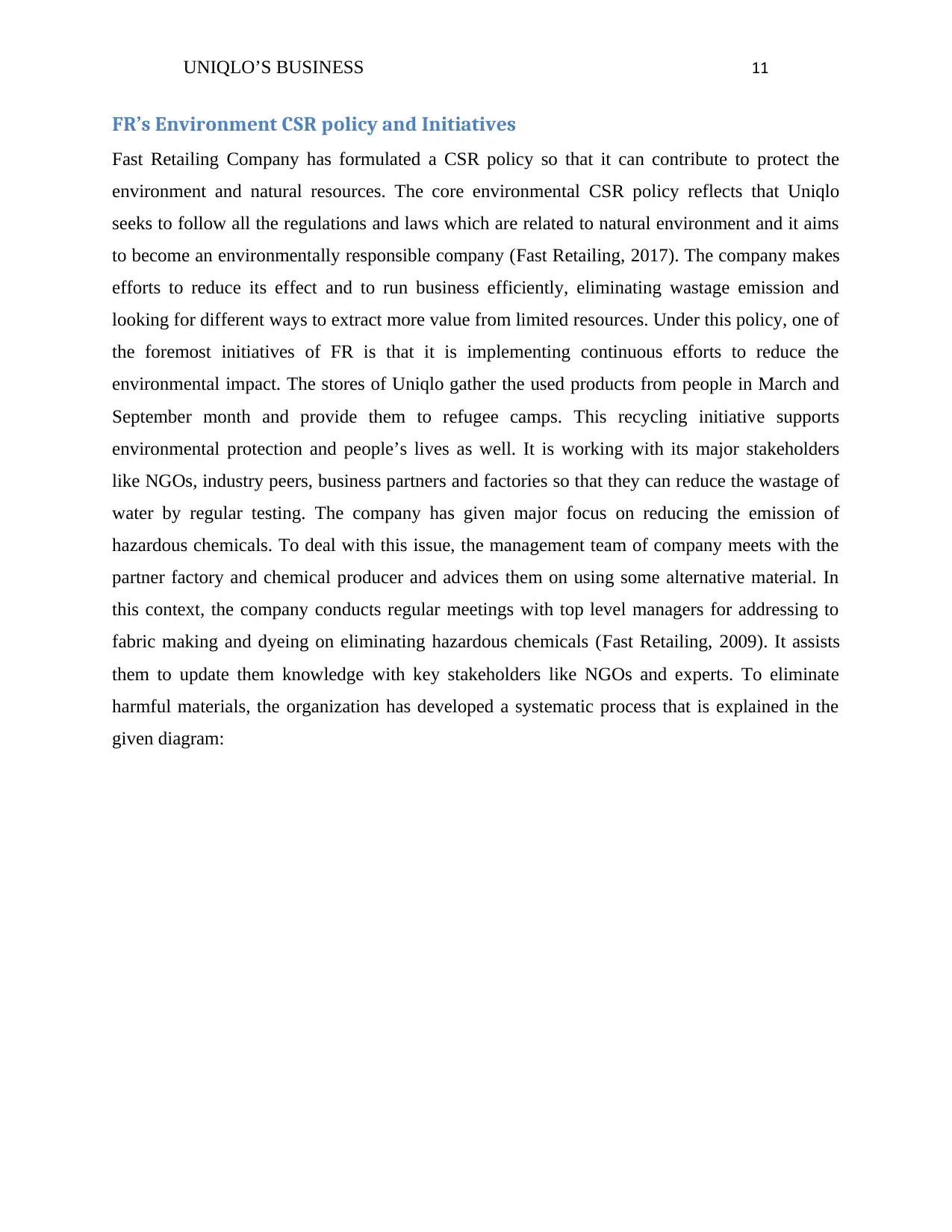
UNIQLO’S BUSINESS 11
FR’s Environment CSR policy and Initiatives
Fast Retailing Company has formulated a CSR policy so that it can contribute to protect the
environment and natural resources. The core environmental CSR policy reflects that Uniqlo
seeks to follow all the regulations and laws which are related to natural environment and it aims
to become an environmentally responsible company (Fast Retailing, 2017). The company makes
efforts to reduce its effect and to run business efficiently, eliminating wastage emission and
looking for different ways to extract more value from limited resources. Under this policy, one of
the foremost initiatives of FR is that it is implementing continuous efforts to reduce the
environmental impact. The stores of Uniqlo gather the used products from people in March and
September month and provide them to refugee camps. This recycling initiative supports
environmental protection and people’s lives as well. It is working with its major stakeholders
like NGOs, industry peers, business partners and factories so that they can reduce the wastage of
water by regular testing. The company has given major focus on reducing the emission of
hazardous chemicals. To deal with this issue, the management team of company meets with the
partner factory and chemical producer and advices them on using some alternative material. In
this context, the company conducts regular meetings with top level managers for addressing to
fabric making and dyeing on eliminating hazardous chemicals (Fast Retailing, 2009). It assists
them to update them knowledge with key stakeholders like NGOs and experts. To eliminate
harmful materials, the organization has developed a systematic process that is explained in the
given diagram:
FR’s Environment CSR policy and Initiatives
Fast Retailing Company has formulated a CSR policy so that it can contribute to protect the
environment and natural resources. The core environmental CSR policy reflects that Uniqlo
seeks to follow all the regulations and laws which are related to natural environment and it aims
to become an environmentally responsible company (Fast Retailing, 2017). The company makes
efforts to reduce its effect and to run business efficiently, eliminating wastage emission and
looking for different ways to extract more value from limited resources. Under this policy, one of
the foremost initiatives of FR is that it is implementing continuous efforts to reduce the
environmental impact. The stores of Uniqlo gather the used products from people in March and
September month and provide them to refugee camps. This recycling initiative supports
environmental protection and people’s lives as well. It is working with its major stakeholders
like NGOs, industry peers, business partners and factories so that they can reduce the wastage of
water by regular testing. The company has given major focus on reducing the emission of
hazardous chemicals. To deal with this issue, the management team of company meets with the
partner factory and chemical producer and advices them on using some alternative material. In
this context, the company conducts regular meetings with top level managers for addressing to
fabric making and dyeing on eliminating hazardous chemicals (Fast Retailing, 2009). It assists
them to update them knowledge with key stakeholders like NGOs and experts. To eliminate
harmful materials, the organization has developed a systematic process that is explained in the
given diagram:
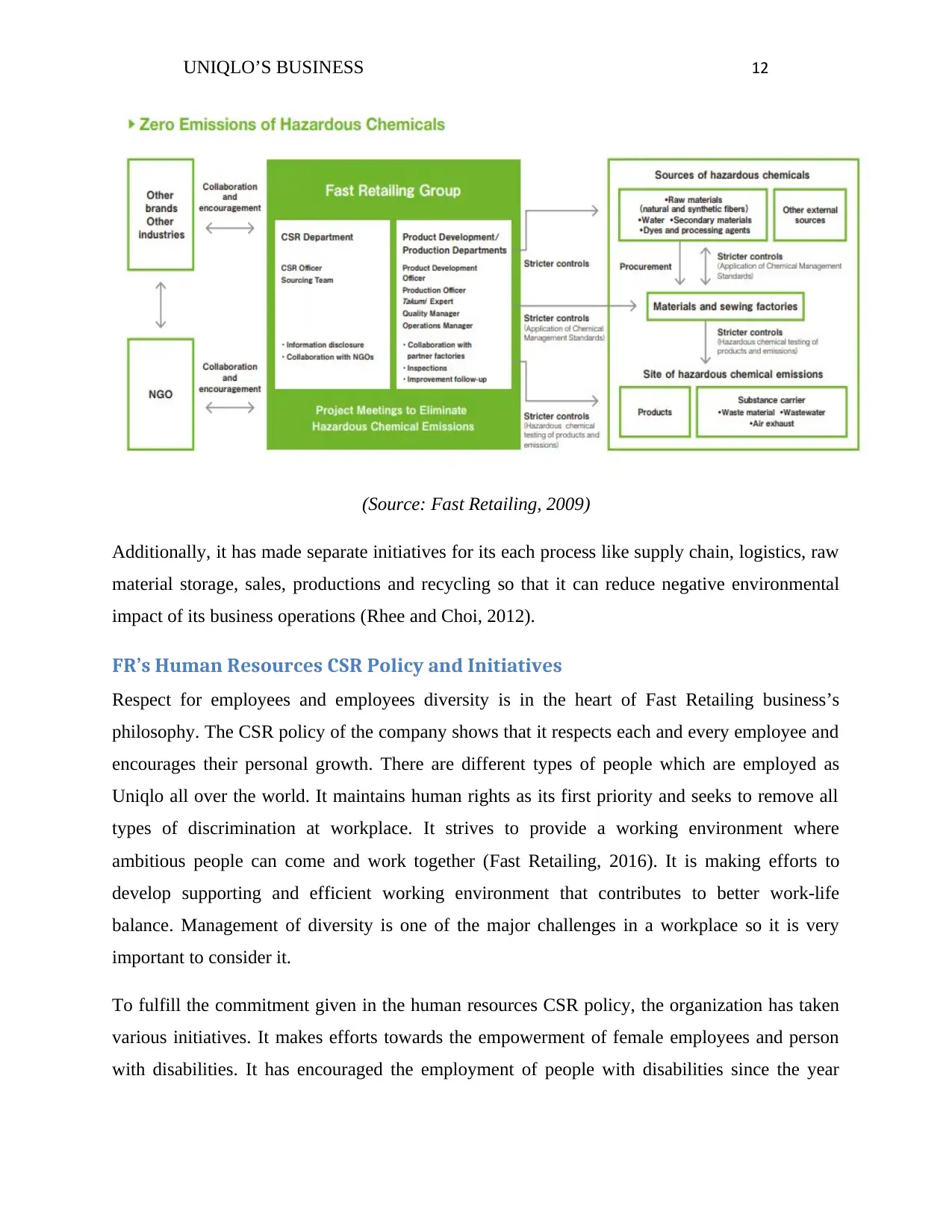
UNIQLO’S BUSINESS 12
(Source: Fast Retailing, 2009)
Additionally, it has made separate initiatives for its each process like supply chain, logistics, raw
material storage, sales, productions and recycling so that it can reduce negative environmental
impact of its business operations (Rhee and Choi, 2012).
FR’s Human Resources CSR Policy and Initiatives
Respect for employees and employees diversity is in the heart of Fast Retailing business’s
philosophy. The CSR policy of the company shows that it respects each and every employee and
encourages their personal growth. There are different types of people which are employed as
Uniqlo all over the world. It maintains human rights as its first priority and seeks to remove all
types of discrimination at workplace. It strives to provide a working environment where
ambitious people can come and work together (Fast Retailing, 2016). It is making efforts to
develop supporting and efficient working environment that contributes to better work-life
balance. Management of diversity is one of the major challenges in a workplace so it is very
important to consider it.
To fulfill the commitment given in the human resources CSR policy, the organization has taken
various initiatives. It makes efforts towards the empowerment of female employees and person
with disabilities. It has encouraged the employment of people with disabilities since the year
(Source: Fast Retailing, 2009)
Additionally, it has made separate initiatives for its each process like supply chain, logistics, raw
material storage, sales, productions and recycling so that it can reduce negative environmental
impact of its business operations (Rhee and Choi, 2012).
FR’s Human Resources CSR Policy and Initiatives
Respect for employees and employees diversity is in the heart of Fast Retailing business’s
philosophy. The CSR policy of the company shows that it respects each and every employee and
encourages their personal growth. There are different types of people which are employed as
Uniqlo all over the world. It maintains human rights as its first priority and seeks to remove all
types of discrimination at workplace. It strives to provide a working environment where
ambitious people can come and work together (Fast Retailing, 2016). It is making efforts to
develop supporting and efficient working environment that contributes to better work-life
balance. Management of diversity is one of the major challenges in a workplace so it is very
important to consider it.
To fulfill the commitment given in the human resources CSR policy, the organization has taken
various initiatives. It makes efforts towards the empowerment of female employees and person
with disabilities. It has encouraged the employment of people with disabilities since the year
⊘ This is a preview!⊘
Do you want full access?
Subscribe today to unlock all pages.

Trusted by 1+ million students worldwide
1 out of 25
Related Documents
Your All-in-One AI-Powered Toolkit for Academic Success.
+13062052269
info@desklib.com
Available 24*7 on WhatsApp / Email
![[object Object]](/_next/static/media/star-bottom.7253800d.svg)
Unlock your academic potential
Copyright © 2020–2026 A2Z Services. All Rights Reserved. Developed and managed by ZUCOL.




